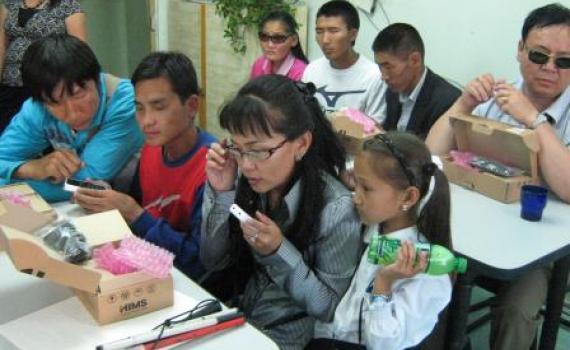
community need
Access to learning and information is extremely limited for Mongolia’s 130,000 blind and visually impaired people. Most are unemployed and live in poverty. Until 2010, Ulaanbaatar Public Library Library (UPL) had over 500,000 books, periodicals and sutras (historical sermons and stories), but only a fraction of these – 428 titles – were in Braille, large print or audio. Mongolia has 21 aimags (provinces), each with a library, but the rural libraries had no materials for visually impaired people.
The innovative service
UPL’s idea was to record books into DAISY format for blind and visually impaired people. Short for Digital Accessible Information System, DAISY technology creates digital talking books from text or analogue audio formats. The books can be accessed on computer or on DAISY BookSense (digital audio) readers. Because content is digitally structured, DAISY users can navigate to find particular sections, revisit sections and cross-refer when doing research.
With support from the EIFL Public Library Innovation Programme (EIFL-PLIP) in 2010, and working with the Mongolian National Federation of the Blind (MNFB), UPL built a digital recording studio and bought 40 DAISY BookSense readers. Blind and visually impaired people voted for a list of books. Top choices were Mongolian history, epic poetry, a novel, home care and cookery manuals, and books on physiology and massage therapy. Librarians trained volunteer readers to record books into DAISY format, and distributed BookSense readers to rural libraries in all 21 provinces.The DAISY Talking Book Centre was ready to start.
eifl-plip project timeline
May 2010 - April 2011.
achievements and Impact
-
This service is so successful that in 2012 the government changed the Social Welfare Law to include digital book readers as a legal entitlement for all visually impaired people in Mongolia.
-
Before the service, no visually impaired people were visiting rural libraries, but after just one year (2010/11), 21 rural libraries reported an average of three visually impaired visitors a day.
-
Book titles, chosen by blind and visually impaired people, include vocational skills manuals, and the service is helping visually impaired people into employment and further education.
-
Inspired by the success of the project, the MNFB has also built a digital recording studio, doubling Mongolia’s capacity to produce DAISY books.
additional resources
Read a two-page case study about the DAISY Talking Books project.
More public libraries contributing to digital inclusion
Read about more innovative public library services that contribute to digital inclusion in the community. PLIP-DIGITAL-INCLUSION





